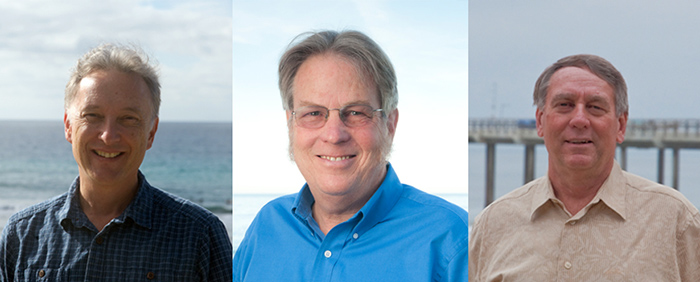Three Scripps Professors Named ASLO Sustaining Fellows
2015 Fellows honored for their contribution to the aquatic sciences
Published Date
Article Content
The Association for the Sciences of Limnology and Oceanography (ASLO) has recognized three Scripps Institution of Oceanography at UC San Diego professors as 2015 Sustaining Fellows in honor of their sustained excellence in contribution to ASLO and the aquatic sciences.

Scripps Professors Peter Franks, Mark Ohman, and Michael Landry
Peter Franks, Michael Landry and Mark Ohman were among 29 members in the inaugural class of ASLO Sustaining Fellows. The ASLO Fellows program was initiated in 2015 to honor ASLO members who have advanced the aquatic sciences via their exceptional contributions to the benefit of the society and its publications, meetings, and other activities.
The 2015 Fellows will be honored at the ASLO Meeting in Santa Fe in June of 2016.
“We are extremely pleased to announce the inaugural class of ASLO Fellows,” said ASLO President Jim Elser. “The commitment and service of these individuals to ASLO have enabled our society to advance the sciences of limnology and oceanography.”
Peter Franks, a professor of biological oceanography and director of the Integrative Oceanography Division at Scripps Oceanography, conducts research on red tides, phytoplankton ecology, and the interaction of physical and biological processes in the ocean. Franks’ main interests lie in the study of physical-biological interactions in plankton, exploring how ocean turbulence, internal waves, and fronts affect the growth and distribution patterns of the plankton. Utilizing new instruments and developing new computer models, Franks and his collaborators have been able to explain the sudden occurrence of red-tide patches, the banding patterns often observed during red tides, the accumulation patterns of plankton at fronts, the formation of subsurface thin layers of plankton, and the micro-scale distribution patterns of individual phytoplankton in the ocean.
Michael Landry, a professor of oceanography, focuses his research on plankton food web ecology, specifically the complex trophic interactions of bacteria, phytoplankton, protozoa, and small metazoa, and the effects of physical, chemical, and climate influences on food web organization and dynamics. Much of this research is based on shipboard studies, which have been conducted throughout the subarctic, subtropical, and equatorial Pacific Ocean, the Arabian Sea, the Southern Ocean of Antarctica, and coastal waters of Washington, Oregon, and California.
Mark Ohman, a professor of biological oceanography, conducts research on the population ecology of marine zooplankton, prey-predator interactions, and demographic estimation methods. In addition to serving as curator of the Pelagic Invertebrates Collection of the Scripps Oceanographic Collections, Ohman serves as the lead principal investigator of the National Science Foundation-supported California Current Ecosystem Long-Term Ecological Research (LTER) site. He is currently working on climate change effects on zooplankton of the California Current System, use of inverse models to infer demographic rates in stage-structured zooplankton populations, and autonomous measurements of ocean ecosystems.
The American Society of Limnology and Oceanography (ASLO) traces its roots to the Limnological Society of America (LSA), which was established in 1936 to further interest and research in limnological science. In 1948 the Oceanographic Society of the Pacific merged with the LSA to become the American Society of Limnology and Oceanography.
Share This:
Stay in the Know
Keep up with all the latest from UC San Diego. Subscribe to the newsletter today.



